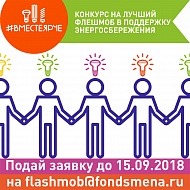Energy-Efficient and Smart Cities: French and Russian Experience

KEY CONCLUSIONS
Smart cities are an intensively developing sector of the economy
“The global smart city market will be worth EUR 9 billion in 2020”, Ambassador Extraordinary and Plenipotentiary of the French Republic to the Russian Federation Sylvie-Agnes Bermann said.
Digitalization affects all areas of the modern economy
“All the digital transformations that are taking place in the modern world affect the main sectors – industry, transport, and energy”, General Director of the Russian Energy Center of the Russian Ministry of Energy Anatoly Tikhonov said.
“The development of optical fibre and gadgets [...] is conducive to the development of robotic automation and other areas of digital technology. All these technologies will be used in the development of smart cities and involved in improving the living conditions of their residents”, Bermann said.
“First and foremost, smart city technology, of course, means smart grids. In addition to smart grids [...] it means the technology of digital substations [...] Such systems make it possible to combine all levels of management of the power grid sector and increase reliability”, Tikhonov said.
Cities are starting to become responsible for their own economic development
“Some cities in the regions understand that they must take care of their own destiny and take responsibility for their economic development”, Director of the Sophia Antipolis Foundation, Chairman of the Russian Technology Foundation Board of Directors, and Global Energy Prize expert Dominique Fache said
“Today, a lot of global changes are taking place, new technological trends are emerging, and all this together will dictate what the cities of the near future will look like”, Member of the Committee on Entrepreneurship in the Housing and Utilities Sector at the Russian Chamber of Commerce and Industry and Danfoss General Director Mikhail Shapiro said.
Digitalization reduces bureaucracy
“The state’s role with regard to digitalization trends should be reduced in terms of an official’s subjective influence on the decision-making chain [...] And one more principle is the priority of the digital document over its paper equivalent [...] A history with digital documents significantly speeds up all processes”, Minister of the Moscow Government and Head of the Moscow Department of Information Technologies Eduard Lysenko said.
PROBLEMS
Negative environmental impact of cities
“Cities that occupy only 2% of the Earth’s surface account for 75% of energy consumed and 80% of CO2 emissions”, Rector of Moscow State Institute of International Relations (University) of the Russian Ministry of Foreign Affairs Anatoly Torkunov said.
“We are seeing population growth, increased emissions, and growing pollution, including waste. On the one hand, there has been a significant increase in the manmade impact, while, on the other hand, we have an increased desire and expectations that we have to live in a comfortable environment and that it must be environmentally friendly”, Shapiro said.
Digitalization contributes to the vulnerability of economic processes
“A ‘smart something’ is very dangerous [...] Because every time you install a meter or install a regulatory system, you install a crack that is a vulnerability for hackers [...] All energy companies as well as banks are in a situation where they are highly vulnerable to terrorism”, Fache said.
SOLUTIONS
Guiding smart cities towards human interests
“Smart city strategies, like digital technologies, should [serve the interests of] citizens”, Bermann said.
“In everything that we do, we must focus on people in one way or another”, Lysenko said.
“Today, the most important thing in the overall policy for meeting the trends of the times and modernity is [to build] a city for people, a city for creative people, and a city for people who would like to live in this city, and to create something in this city”, Mayor of Irkutsk Dmitry Berdnikov said.
“The goal of any investment project, especially a modern, digital project, is to improve the quality of life and the quality of services we provide to the public”, Tikhonov said.
Planning with due regard for energy objectives
“We must include energy issues in the first phases of urban planning”, Group Manager for Smart and Sustainable Cities at the European Institute for Energy Research (EIFER) Alberto Pasanisi said.
Improving energy efficiency
“Digital tools play an important role in supporting cities as far as optimization is concerned in order to reduce emissions and reduce traffic jams in cities”, Bermann said.
“Energy efficiency is the key to energy transition at the local and international level. We need it to fight climate change”, Executive Director of the Secretariat at the International Partnership for Energy Efficiency Cooperation (IPEEC) Benoit Lebot said.
“[A smart city] that provides comfortable living conditions not only for the present but also for the future generation is a city that operates based on the principles of sustainable development. And the availability of energy resources and their sustainable consumption are generally recognized conditions for urban development, while new efficient technologies are their essential means”, Torkunov said.
An integrated approach to urban development
“One key aspect is the connection between different technologies in the interests of urban planning, city management, and the development of various sciences and social aspects”, Pasanisi said.
“The smart technologies market is a very large market, and our job as participants in government regulation is to create opportunities in this business and choose technologies to ensure projects are worthwhile and that we aren’t ashamed of ourselves”, Tikhonov said.
Involving residents in urban processes
“There has been serious evolution in residents’ involvement – from complete nihilism, when they negatively perceive any interference in the area in which they live, to engagement, when people themselves go to a factory that produces equipment and want to choose specific types of floors and walls”, Head of the Smart Block Working Group and General Director of Moslift Vardan Avakyan said.





